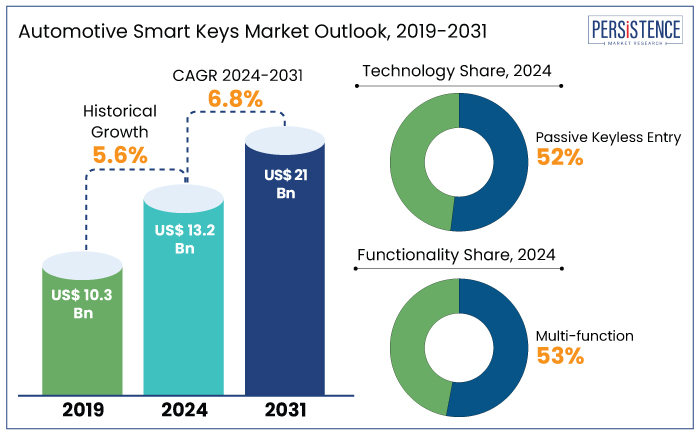Industry: Automotive & Transportation
Published Date: January-2025
Format: PPT*, PDF, EXCEL
Delivery Timelines: Contact Sales
Number of Pages: 190
Report ID: PMRREP23803
The global automotive smart keys market is projected to witness a CAGR of 6.8% during the forecast period from 2024 to 2031. It is anticipated to increase from US$ 13.2 Bn recorded in 2024 to a decent US$ 21 Bn by 2031.
The global market is gaining significant momentum due to rapid growth in the passenger and commercial vehicle segments. Increasing integration of novel security and convenience features in vehicles has positioned the automotive industry as a key end-use driver for smart key technologies.
Rising adoption of electric and luxury vehicles is spurring demand for Passive Keyless Entry (PKE) and multi-functional systems globally. This growth aligns with consumers' expectations for seamless, secure vehicle access. It is mainly driven by innovations in automotive electronics and IoT-enabled functionalities.
According to data from the European Automobile Manufacturers Association (ACEA), global production of electric vehicles surged by over 65% in 2023, underscoring the increasing reliance on unique keyless systems for enhanced vehicle connectivity. Similarly, the U.S. Department of Transportation reported significant adoption of keyless entry systems in over 80% of new vehicle models as of 2023. This reflects widespread technological integration and consumer preference trends.

Key Highlights of the Market
|
Market Attributes |
Key Insights |
|
Automotive Smart Keys Market Size (2024E) |
US$ 13.2 Bn |
|
Projected Market Value (2031F) |
US$ 21 Bn |
|
Global Market Growth Rate (CAGR 2024 to 2031) |
6.8% |
|
Historical Market Growth Rate (CAGR 2019 to 2023) |
5.6% |
Europe is poised to witness a significant CAGR of 7.1% in the automotive smart keys market through 2031. It is projected to hold a share of 30% in 2024. This growth is driven by the region’s strong automotive industry and early adoption of unique technologies.
As home to renowned automakers such as BMW, Mercedes-Benz, and Audi, Germany remains at the forefront of integrating cutting-edge smart key systems, improving both vehicle security and convenience. This leadership is further strengthened by the widespread adoption of smart keys in luxury and premium vehicles. The country’s ongoing investment in electric and connected vehicle technologies is anticipated to fuel demand.
Germany's leadership in Europe is reinforced by its focus on luxury and premium vehicles, where smart keys are standard. With strong investments in electric and connected vehicle technologies, Germany has set itself apart from other countries like France and the U.K. This push aligns with consumer demand for keyless entry systems in both high-end and compact vehicles, driving market growth. For example,
In South Asia and Oceania, the automotive smart keys industry is projected to showcase a decent CAGR of 7.4% through 2031. India holds a dominant market share in the region due to its rapidly rising automotive sector and increasing integration of unique technologies in vehicles.
The country's burgeoning middle class and rising demand for passenger vehicles, including compact and midsize cars, have accelerated adoption of smart key systems. This factor is set to help establish India as a key player in the regional market.
India's dominance is also driven by the adoption of smart keys in various vehicle categories, from budget-friendly passenger cars to luxury models. The country’s focus on improving vehicle security and convenience across all market segments, coupled with a thriving electric vehicle industry, further cements its leadership in the region. For instance,
Passive Keyless Entry (PKE) technology is poised to lead the automotive smart keys market, with an anticipated CAGR of 7.1% in the next ten years. It is set to hold a share of 52% in 2024. This technology offers novel security and convenience, enabling users to unlock and start their vehicles without having to remove the key from their pocket or bag.
The seamless, touchless experience provided by PKE systems is increasingly popular in both luxury and mass-market vehicles, as well as in EVs. Their growing adoption is driven by increasing demand for enhanced security, ease of use, and the shift toward contactless technology solutions.
Key automotive manufacturers worldwide integrate PKE technology to offer unique functionalities like remote start, access control, and security enhancements. For example,
The multi-function segment of the automotive smart keys market is projected to rise at a CAGR of 6.9% from 2024 to 2031. Multi-function smart keys are currently leading the market due to their ability to offer a wide range of features beyond basic entry and ignition. The segment is anticipated to hold a share of 53% in 2024.
The advanced keys include functionalities such as remote start, personalized settings, and seamless integration with other vehicle systems, making them increasingly popular among both consumers and manufacturers. As demand for greater convenience and security, particularly in luxury and EVs continues to rise, multi-function keys have become an essential component of modern automotive technology.
The trend is particularly strong in the luxury vehicle segment, where consumers expect a high level of technological integration. Multi-function keys allow users to control various aspects of their vehicles, such as adjusting seat positions, climate settings, and entertainment preferences, providing a superior ownership experience. These features have contributed to the widespread use of multi-function keys in both high-end and mainstream vehicles. For instance,
The automotive smart keys industry is likely to see significant growth, driven by increasing demand for unique security and convenience features. With the rise of Electric Vehicles (EVs) and luxury cars, the need for more sophisticated key technologies, including keyless entry, remote start, and personalized vehicle settings, is surging. This trend presents significant opportunities for smart key manufacturers to increase their market share by integrating cutting-edge technologies, such as biometrics and Bluetooth connectivity.
The global market is currently seeing a shift toward the integration of multi-functional and Passive Keyless Entry (PKE) systems, particularly in high-end vehicles. Demand for smart keys is being fueled by consumer preference for added convenience, security, and technological developments. As the adoption of EVs rises, the need for unique keyless entry systems is also increasing, making PKE technology a prominent trend in the market.
Such trends align closely with applications in luxury and EVs, where smart keys offer not just security but also enhanced user experiences. This growing trend is evident in the increasing deployment of multi-functional smart keys. These mainly cater to the evolving needs of tech-savvy consumers who seek seamless vehicle integration.

The global automotive smart keys industry witnessed a steady CAGR of 5.6% during the historical period from 2019 to 2023. The market has consistently surged as manufacturers have increasingly integrated novel security and convenience features into vehicles. Introduction of remote and passive keyless entry systems in the early 2000s set the foundation for this growth, particularly in luxury and high-end vehicle segments.
The market continues to rise, driven by surging consumer demand for enhanced vehicle security and comfort. Increasing integration of new technologies like biometrics and connectivity features is also set to push demand. The rise of electric and connected vehicles is further boosting the need for unique key systems. For instance,
Sales of automotive smart keys are estimated to record a CAGR of 6.8% during the forecast period between 2024 and 2031.
Increasing Demand for Superior Vehicle Security and Convenience to Boost Sales
A key driver in the automotive smart keys market is the rising demand for enhanced vehicle security and convenience. Consumers are increasingly opting for unique keyless entry systems that allow easy vehicle access, starting, and personalization of settings.
Novel features not only provide convenience but also improve vehicle security by reducing the chances of traditional key theft. Growth in this segment is particularly driven by luxury vehicles, where manufacturers are integrating sophisticated smart key systems to attract tech-savvy customers. This demand is spreading to mainstream models, driven by the rising adoption of connected technologies in vehicles. For example,
Rapid Shift toward Keyless Entry and Personalized Vehicle Access to Push Demand
The booming Electric Vehicle (EV) industry has significantly contributed to the adoption of novel smart key technology. As EVs become more connected and integrated with digital ecosystems, keyless entry and personalized vehicle access through smartphones have gained momentum.
EV manufacturers are focusing on increasing the connectivity of their vehicles, with smart keys playing a key role in enhancing user experience. These keys often feature functionalities like remote start, unlocking, and vehicle location tracking. As a result, smart keys are seen as a critical component for modern EVs, which are designed to be tech-forward and provide an eco-friendly, seamless driving experience. For instance,
Rising Concerns of Hacking and Cybersecurity Issues Remain a Key Hindrance
The intricate integration of smart key technology into modern vehicles remains a significant hurdle, requiring new systems and seamless compatibility. This complexity often leads to reliability challenges and slows the adoption of smart keys, especially in regions with less-developed technical expertise. Moreover, reliance on digital platforms introduces vulnerabilities, exposing vehicles to potential hacking and cybersecurity threats.
Manufacturers are hence investing in robust encryption and innovative security measures to address these challenges. However, rising consumer and regulatory scrutiny continues to exert pressure on the industry. While these issues do not halt market growth, they compel key players to enhance system reliability and protect sensitive data to sustain customer trust.
Booming EV Segment in China to Create Novel Growth Prospects
China's burgeoning Electric Vehicle (EV) industry provides a massive growth avenue for automotive smart keys. With government initiatives promoting EV adoption and record-breaking sales, new technologies like Passive Keyless Entry (PKE) are becoming essential for enhancing user convenience and vehicle security.
High urbanization rates and consumer demand for luxury features further amplify the need for smart key solutions. It is especially evident among leading domestic and global automakers targeting China’s market.
Several manufacturers are collaborating with EV brands to integrate next-generation keyless systems, demonstrating their alignment with evolving market demands. For example,
Increasing Luxury Vehicle Demand in Germany to Forge New Opportunities
Germany, the heart of Europe's automotive industry, presents significant opportunities as luxury car demand rises steadily. With brands like BMW, Mercedes-Benz, and Audi prioritizing technological sophistication, adoption of multifunction smart keys has become a pivotal trend. Government-backed support for innovation in automotive technology complements this growth, positioning Germany as a leader in novel smart key implementation.
Luxury car manufacturers are adopting unique smart key functionalities to maintain competitive advantages. For instance,
The global automotive smart keys market is characterized by intense competition among key players, including Continental AG, Denso Corporation, Valeo, and Hyundai Mobis. These companies leverage their strong research capabilities to enhance product functionalities such as biometrics, app-based controls, and multi-functionality.
Tier-1 suppliers dominate, focusing on partnerships with automakers to deliver customized solutions. Emerging players are penetrating the market by offering cost-effective innovations tailored to regional needs, particularly in Asia Pacific.
To capture growth opportunities, competitors are investing in strategic initiatives like product launches, collaborations, and acquisitions. For instance, in 2023, Continental extended its digital access solutions portfolio, emphasizing secure, keyless entry systems for electric vehicles.
Valeo, on the other hand, partnered with automakers to integrate smart keys with in-vehicle connectivity features, reinforcing its leadership in novel security technology. These strategies reflect a competitive drive to address evolving consumer preferences and the global shift toward connected mobility solutions.
Recent Industry Developments
|
Attributes |
Details |
|
Forecast Period |
2024 to 2031 |
|
Historical Data Available for |
2019 to 2023 |
|
Market Analysis |
US$ Billion for Value |
|
Key Regions Covered |
|
|
Key Market Segments Covered |
|
|
Key Companies Profiled in the Report |
|
|
Report Coverage |
|
|
Customization and Pricing |
Available upon request |
By Technology
By Functionality
By Vehicle Type
By Region
To know more about delivery timeline for this report Contact Sales

Yes, the market is set to reach US$ 21 Bn by 2031.
The passenger vehicle segment is anticipated to generate significant demand for automotive smart keys.
Europe is projected to witness a CAGR of 7.1% through 2031.
Continental AG, Denso Corp., and HELLA GmbH are leading the global market.